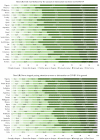Digital Information Approach through Social Media among Gen Z and Millennials: The Global Scenario during the COVID-19 Pandemic
- PMID: 36366331
- PMCID: PMC9696549
- DOI: 10.3390/vaccines10111822
Digital Information Approach through Social Media among Gen Z and Millennials: The Global Scenario during the COVID-19 Pandemic
Abstract
An infodemic represents a concern for public health, influencing the general population's perceptions of key health issues. Misinformation is rapidly spread by social media, particularly among young generations. We used data from the WHO "Social Media and COVID-19" study, which was conducted in 24 countries worldwide on over 23,000 subjects aged 18-40 years, to explore Generation Z and Millennials' models for health-information-seeking behaviors on social media. We summarized data on the most used sources of information, content of interest, and content sharing, as well as the sentiment toward the infodemic, through descriptive statistics and Chi-square test to verify the differences between groups. Among the survey respondents, 9475 (40.3%) were from high-income countries (HIC), 8000 (34.1%) from upper-middle-income countries (UMIC), and 6007 (25.6%) from lower-middle-income countries (LMIC). Social media were the most used sources of information to retrieve news on COVID-19 disease (about 79% in HIC, 87% in UMIC, and 90% in LIC) and the COVID-19 vaccine (about 78% in HIC and about 88% in UMIC and LIC). More than a half of the young respondents declared that they pay attention to scientific contents (about 51% in HIC, 59% in UMIC, and 55% in LMIC). Finally, most young participants reported feeling overwhelmed by the infodemic. However, this sentiment did not stop them from seeking information about COVID-19. Our findings highlight the importance of shaping public health interventions and campaigns on social media platforms and leveraging scientific contents. Public health authorities should work also on strategies to improve the digital literacy of the population as a driving force to empower them and achieve better health outcomes.
Keywords: COVID-19; Gen Z; Millennials; digital information; social media; survey.
Conflict of interest statement
The authors declare no conflict of interest.
Figures


References
-
- World Health Organization Infodemic. [(accessed on 25 September 2022)]. Available online: https://www.who.int/health-topics/infodemic#tab=tab_1.
-
- Mccombs M.E., Shaw D.L. The Agenda-Setting Function of Mass Media. Public Opin. Q. 1972;36:176–187. doi: 10.1086/267990. - DOI
-
- News Influence on Our Pictures of the World—PsycNET. [(accessed on 26 September 2022)]. Available online: https://psycnet.apa.org/record/2002-00742-001.
LinkOut - more resources
Full Text Sources

